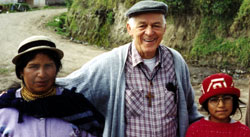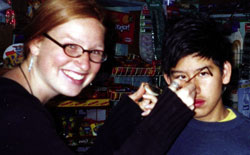Lord, that I may see
Through the efforts of volunteers, missioners and a Canadian organization, people in mountain communities receive the gift of sight
By Fr. Charles Gervais, S.F.M.
October 2004
Return to Table of Contents
Print Article
High in the Andes mountains near Riobamba, Ecuador, the indigenous people work long days cultivating the land. At this altitude, the strong ultraviolet rays and the volcanic dust swirled around by the wind wreak havoc on their eyes.

This young girl, here with her mother and Fr. Charles Gervais, has just received much-needed glasses for the first time. Riobamba, Ecuador.
Scarboro lay missioner Carolyn Beukeboom worked for three years as a nurse at La Consolata, a little hospital in the village of Punin outside the city of Riobamba. The hospital was built especially for the indigenous poor in the area. It was not long before Carolyn became aware of the people's many eye problems.
While in Canada on leave, Carolyn enquired into the possibility of setting up an eyeglass clinic in Punin. She contacted Joanne Atkinson, the coordinator of the eyeglass program for Rayjon Share Care, an organization in Sarnia, Ontario. Through this program, the organization distributes used prescription glasses to people in developing countries, and assembles a team of volunteer optometry professionals and support staff to conduct clinics in host countries.
Carolyn and Joanne worked out the details and obtained the necessary paperwork from the Ministry of Health to enter Ecuador with eye exam equipment and 3,000 pairs of glasses.
The two women arrived in Ecuador with a team of three optometrists, two optometry students from the University of Waterloo, Ontario, and 15 support staff. All of them had paid their own airfare to offer this clinic to the poor.
Members of Scarboro's mission team in Ecuador, Micheline Karvonen, Sylvie Sabourin, Carolyn and I, offered to be interpreters. Also helping were two students, Daphne Morrison and Michael Solderstrom, from Pearson College in Vancouver. They were in Riobamba for a year, living among the poor and working as teachers' assistants at an elementary school.
During the eye examinations, many of the people were in tears, repeating the words, "Gracias, gracias." (Thank you, thank you.) They had never received such special attention in their lives. More than 1,100 people were examined. Most were fitted with eyeglasses. However, 32 people needed cataract surgery or another type of eye operation and were placed on a referral list. The hospital would find a surgeon to do the operations at a price that the people could afford.

Daphne Morrison, a Canadian student spending a year in Ecuador, helped with the eyeglass project.
There were 27 people needing special glasses to be made in Canada and sent back to the hospital in Punin. Sadly, in December 2003 La Consolata Hospital closed due to a lack of funds. This presented a problem because the operation referrals were to be coordinated there. As well, the people awaiting specially-made glasses were to pick them up there.
We are happy to report that La Consolata reopened in May 2004, although to a lesser capacity. However, when it had closed, Daphne and I took on the responsibility of distributing the glasses and some of our experiences are worth mentioning.
One Saturday morning, we drove to Argentina's Street where 13-year-old Miguel Santillan Paucar lived. Argentinas Street is more than a kilometre long and the numbering of houses is so erratic that unless you lived in Riobamba all your life, you would have difficulty finding an address. I went to a little corner store and asked the owners if they could direct us to Miguel's address.
"Oh, we know Miguel!" they said. "He is our son's best friend. He just lives down the street."
Their son took us to the address and we gave Miguel his glasses. With much gratitude, Miguel's family offered us a soft drink and a piece of bread, and sent us away with a dozen eggs.
Miguel's oldest brother offered to help us find others on our list. We drove to Mocha, a rural town about a 40-minutes away, with residents scattered for miles around. We stopped at what seemed to be the centre of town to ask if anyone might know where we could find a seven-year-old boy named Manuel. The first person we asked happened to be a dirigente, a community leader, who knew where everyone lived. He came with us and we found Manuel on a farm about two kilometres away picking apples with his parents. Of course we came home with half a bushel of apples.
For those people needing a cataract operation, Micheline Karvonen contacted Dr. Byron Sancho, a surgeon from Quito who comes to Riobamba twice a month to do eye surgery. He agreed to do the operations at the Hospital Andino Alternativo de Chimborazo, asking only that the people, if they can, pay for the materials that he uses and the medication.
As of today, 20 people have received eye operations and have been blessed with the gift of sight. A project like this makes the heart sing. "Lord, that I may see."
Return to Table of Contents
Print Article